|
|
|
Sort Order |
|
|
|
Items / Page
|
|
|
|
|
|
|
| Srl | Item |
| 1 |
ID:
094041


|
|
|
|
|
| Publication |
2010.
|
| Summary/Abstract |
During the third quarter of 2009, there was a spate of reports in the news media and on the Internet accusing Burma and North Korea of engaging in a range of activities that potentially threatened regional security. It was claimed that the Naypyidaw regime had developed a close relationship with Pyongyang that included North Korea's sale to Burma of conventional weapons, assistance in the development of Burma's defence infrastructure and arms industries, and even collaboration on a nuclear weapons program. Given the lack of hard evidence, however, these reports raised more questions than they answered. Burma's nuclear status remains unknown. Another puzzle is why no government or international organisation has yet made an official statement on this particular issue, despite all the publicity it has attracted. Should it be determined that Burma does indeed have a secret nuclear weapons program, then a key question would be whether the generals are likely to be any more receptive to international concerns than they have been in the past, on other issues.
|
|
|
|
|
|
|
|
|
|
|
|
|
|
|
|
| 2 |
ID:
100659


|
|
|
| 3 |
ID:
116032
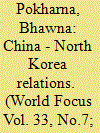

|
|
|
| 4 |
ID:
180870
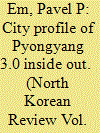

|
|
|
| 5 |
ID:
091181
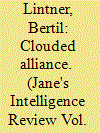

|
|
|
|
|
| Publication |
2009.
|
| Summary/Abstract |
Speculation about the nature of military co-operation between North Korea and Myanmar has abounded since the two Asian states re-established diplomatic relations in April 2007.Concerns were heightened in June 2009 when a North Korean freighter destined for Myanmar was suspected of carrying military argo in violation of UN Security Council sanctions.
|
|
|
|
|
|
|
|
|
|
|
|
|
|
|
|
| 6 |
ID:
115058
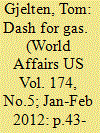

|
|
|
|
|
| Publication |
2012.
|
| Summary/Abstract |
For a fresh perspective on geopolitical trends, look at the world through the lens of the natural gas trade. One of the reasons for Israeli unease with the Arab Spring is that the democratic uprising that took down Hosni Mubarak also brought interruptions in Israel's supply of natural gas, much of which since 2008 has come from Egypt. Wondering about China's new interest in Australia and Qatar? It's about their abundant gas supplies and China's tremendous energy needs. Desperate for signs of cooperation from North Korea? Check out reports that Kim Jong-il may agree to the construction of a natural gas pipeline that would link Russia, Pyongyang, and Seoul. From Asia to the Middle East to North America, a boom in natural gas usage is rearranging international connections, with major repercussions for global politics.
|
|
|
|
|
|
|
|
|
|
|
|
|
|
|
|
| 7 |
ID:
116680
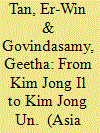

|
|
|
|
|
| Publication |
2012.
|
| Summary/Abstract |
The recent death of Kim Jong Il and the succession of his son, Kim Jong Un, as Supreme Leader of the Democratic People's Republic of Korea leaves the Northeast Asian region at a crossroads. Given the younger Kim's lack of political experience, it is reasonable to believe that his priority will be on consolidation of his political and military power base in Pyongyang. More recently, the Democratic People's Republic of Korea (DPRK) has sent mixed signals with regard to its intentions. On the one hand, North Korea has agreed to a moratorium of its nuclear activities and has even invited the IAEA to inspect its nuclear facilities; at the same time, however, the DPRK has also announced its plan to launch a satellite in mid-April, using technology derived from the Taepodong missile. Set against this backdrop, we underline and comparatively assess the importance of the USA, the Republic of Korea, and China, all of which will be going through a political transition in 2012. We conclude that Seoul and Beijing are in the best position to reopen the process of dialogue with the DPRK.
|
|
|
|
|
|
|
|
|
|
|
|
|
|
|
|
| 8 |
ID:
092148
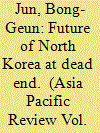

|
|
|
|
|
| Publication |
2009.
|
| Summary/Abstract |
Since Chairman Kim Jong-il's reported stroke in August 2008, the stability or instability of the North Korean system has come under the spotlight. North Korea's one-man ruling communist and state-planned economic system will constantly come under pressure at home and abroad for change. For now, North Korea withstands the pressure for change with a strong state mechanism. If Pyongyang continues to allow its systemic rigidity to hinder opportunities for adjustment and change, then the deepening internal contradictions, the people's growing discontent, and increasing discord with the external environment may push the North Korean system to a critical breaking point. As the uncertainties shrouding the North Korean regime and system steadily increase, it has become urgent to accurately analyze and assess the present and the future of North Korea. While preparing for an uncertain future of North Korea, it is also necessary that the members of the Six-Party Talks exercise more efforts to generate genuine and positive changes in North Korea.
|
|
|
|
|
|
|
|
|
|
|
|
|
|
|
|
| 9 |
ID:
131380


|
|
|
| 10 |
ID:
112435


|
|
|
|
|
| Publication |
2012.
|
| Summary/Abstract |
As China's economic and foreign policies increasingly move away from the country's past socialist ideals, Beijing's attitude towards the DPRK has, in recent years, begun to subtly change. However, the close historic ties that exist between the two ruling communist parties prevent such changes from being overtly publicized in official discourses; criticizing the DPRK in China readily results in serious protests from Pyongyang. The popular perception in China of the DPRK, which is far more critical than the official version, is, on the other hand, hard to hide. In an authoritarian nation where exhibiting sentiments contrary to the party-state's policy is still not a safe and established practice, the Chinese people have increasingly relied on the platform of the Internet to express their views on various aspects of policy, including that towards the DPRK. This makes the Internet a rich resource for academics to gauge down-to-earth public opinion and how it contrasts with the official policy. Drawing on systematic, qualitative research on the online community, this article wishes to explore the possible differences between the written policy of Beijing and popular Chinese perceptions, or consensus if any, towards Pyongyang. The article is written in three parts. The first reviews the relevant literature on Beijing's contemporary policy towards the DPRK, the role of Internet opinions in Chinese foreign policy making, and introduces our methodology. The main part of the article typologizes and analyses the images as perceived by Chinese Internet users of the DPRK, its leaders and polices, as well as Beijing's DPRK policy, in order to highlight the differences between official policies and online opinions. Explanations for the discrepancies with the official line and the possible implications of our findings for China's future policy on the DPRK are discussed in the concluding section. As witnessed from the research, surprisingly, there was relative consensus of opinion among the different available viewpoints towards the DPRK regime, as both the Chinese nationalists and the liberals are likely to pressure Beijing to walk further away from Kim Jong-il in the future.
|
|
|
|
|
|
|
|
|
|
|
|
|
|
|
|
| 11 |
ID:
109756


|
|
|
| 12 |
ID:
107358
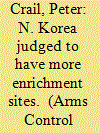

|
|
|
| 13 |
ID:
115811


|
|
|
| 14 |
ID:
181689


|
|
|
|
|
| Summary/Abstract |
The emerging consensus in the United States is that the real US objective in talks with North Korea should no longer be its denuclearisation. The superficially sensible conventional wisdom underlying this position is that Pyongyang learned from America’s adventures in Iraq and Libya that only a nuclear deterrent precludes regime change, and that it would not relinquish something it worked so hard to attain at the negotiating table. These assumptions may still be wrong, and it would be a mistake to pre-emptively surrender an essential objective, especially given that doing so would incentivise Japan and South Korea to acquire nuclear weapons. Washington should carefully explore the possibility that the North would give up its nuclear weapons if it could achieve political, economic and diplomatic integration into the international community and true normalisation of its relations with the US, and prepare for an arduous negotiating process.
|
|
|
|
|
|
|
|
|
|
|
|
|
|
|
|
| 15 |
ID:
098405
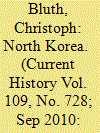

|
|
|
|
|
| Publication |
2010.
|
| Summary/Abstract |
{Adopting} unification as the central goal of policy toward the koreas...would constitute the first step on the road toward a resolution of the crisis on the prninsula.
|
|
|
|
|
|
|
|
|
|
|
|
|
|
|
|
| 16 |
ID:
091880
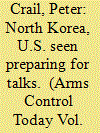

|
|
|
|
|
| Publication |
2009.
|
| Summary/Abstract |
The United States is ready to hold direct talks with North Korea on denuclearization, potentially paving the way for the Obama administration's first formal discussions with Pyongyang, U.S. officials said in September.
Department of State spokesman Philip Crowley told reporters Sept. 11 that the United States is "prepared to enter into a bilateral discussion with North Korea." He added that such talks would be "designed to convince North Korea to come back to the six-party process and to take affirmative steps towards denuclearization."
|
|
|
|
|
|
|
|
|
|
|
|
|
|
|
|
| 17 |
ID:
108556


|
|
|
|
|
| Publication |
2011.
|
| Summary/Abstract |
The threat from North Korea is likely to continue with the apparent absence of
any intent or interest in giving up its nuclear ambitions in the near future. North
Korean provocations are likely to feature conventional weapons backed up by
Pyongyang's nuclear arsenal to deter any Korean and U.S. response against the
North. Overall, there is a possibility of further military challenges from the North
and a more unstable situation on the Korean peninsula, especially during the succession period apparently underway in North Korea. Therefore, resolving the
North Korean nuclear issue through the United Nations Security Council (UNSC)
could help the resumption of the Six-Party Talks (6PT). However, the complex
and intermingled goals of the 6PT are further limited by the new uranium enrichment program. During the present deadlock in these talks, Korea should support
the activities of the UNSC and North Korea Sanctions Committee, strongly
encourage the resumption of the 6PT, and make all diplomatic efforts to focus
international pressure on Pyongyang aimed at making it cease disrupting regional
security or furthering its nuclear ambitions. The best policy towards North Korea
is a peaceful solution of the nuclear crisis through the UNSC together with the
6PT.
|
|
|
|
|
|
|
|
|
|
|
|
|
|
|
|
| 18 |
ID:
108566


|
|
|
|
|
| Publication |
2011.
|
| Summary/Abstract |
Since the Lee Myung-bak administration came to office, the deterioration of the
North-South Korea relationship and heightened tensions on the Korean peninsula
are the direct consequence and responsibility of North Korea and its provocations.
North Korea has chosen confrontation with the South, dictated by its own internal
interests, skewed perceptions and the desire to bully the South into concessions.
The Lee administration's stance toward North Korea is no different from that of its
predecessors in its basic principles and approach to unification as a progressive
integration and not unification through absorption. The difference in the approach
of the Lee administration to North Korea is a stronger emphasis on resolving the
20-year stalemate over the nuclear issue. Previous South Korean administrations
showed themselves willing to resume talks with Pyongyang soon after North
Korean pressure and chronic provocations. However, the Lee administration has
held fast to its position of reciprocity, as it did after the killing of a South Korean
tourist at the Mt. Kumgang resort, where it insisted on a promise that there would
be no recurrence of such an incident, before the tour program could resume. The
Lee administration has refused to reward the North's brinksmanship diplomacy,
knowing that to do this will only encourage Pyongyang's chronic provocations.
|
|
|
|
|
|
|
|
|
|
|
|
|
|
|
|
| 19 |
ID:
091041
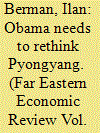

|
|
|
|
|
| Publication |
2009.
|
| Summary/Abstract |
The problem of North Korea has bedeviled policy makers in Washington for years. The notoriously opaque Stalinist state that sits above the 38th Parallel represents one of the world's most intractable security dilemmas. Starting this spring, however, the challenge posed by Pyongyang has grown more acute. The defiant series of nuclear and ballistic tests carried out by Kim Jong Il in May has brought into sharp focus the growing threat posed by the North's strategic arsenal-and precipitated a frenzy of international activity in response.
|
|
|
|
|
|
|
|
|
|
|
|
|
|
|
|
| 20 |
ID:
149637
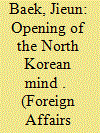

|
|
|
|
|
| Summary/Abstract |
On a cold, clear night in September 2014, a man I’ll call Ahn walked up to the edge of the Tumen River on the Chinese side of the heavily guarded border between China and North Korea. At its narrowest points, the Tumen measures a little over 150 feet wide, and Ahn could easily see the North Korean side from where he stood. In two bags, he was carrying 100 USB drives filled with films, television shows, music, and e-books from around the world.
|
|
|
|
|
|
|
|
|
|
|
|
|
|
|
|
|
|
|
|
|